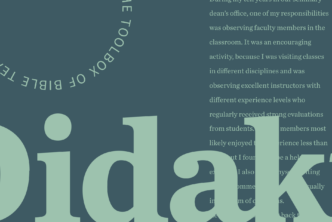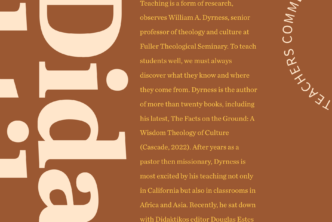
by Brad Nassif | North Park University
North Park is a city-centered university in Chicago that warmly welcomes students of all backgrounds: Christians, Muslims, Jews, Buddhists, Hindus, agnostics, atheists, LGBTQ or none of the above. Our core values are “urban, inter-cultural, and Christian.” We belong to the Evangelical Covenant Church, whose university board has recently asked our faculty to partner with the church by “making disciples” of students without, of course, imposing the faith on anyone. This raises the question: How might a dedicated Christian teach the faith in the context of a religiously diverse population of students?
I want to suggest that the incarnation provides a foundation for integrating Christian faith with academic disciplines, even in a spiritually mixed classroom. Gregory of Nazianzus (c. 325–389) summarized the full extent of the saving work of Christ when he wrote, “Whatsoever has not been assumed has not been healed” (Letter to Cledonius, 101). For Gregory and virtually the entire Greek patristic tradition, if Christ did not take upon himself every single aspect of human nature (except sin) when God became human, then whatever has been left out cannot be saved. It’s a matter of cosmic salvation. The Son of God took unto his divine Person a human body, a human soul and a fully human mind (contra Apollinaris).
What does the God-filled humanity of Christ have to do with integrating Christian faith and academic disciplines? It tells us that the liberal arts cannot be all they were meant to be apart from the incarnation. Christ himself penetrates and transforms the liberal arts. This does not mean we should turn our lecterns into pulpits and our classrooms into Sunday school classes, nor does it mean we should ask non-Christian students to be hypocritical by adopting a perspective they do not presently embrace. It does mean, however, that a Christian professor working in a Christian school may model integration even for non-Christians.
The ways in which faculty members “make disciples” depend partly on their disciplinary location within the university. For example, those who teach liberal arts subjects might raise a different set of questions than those who teach in a biblical or theological department. A liberal arts professor may ask students to explore how the Christian faith might affect the way a believer deals with the fundamental questions of their particular discipline. Specifically, a business professor may ask students to evaluate competing economic theories with a Christian understanding of stewardship; a music teacher may ask students to write about the spiritual lives of great composers; an art teacher may give a lecture on the relation of creation and incarnation to art, and so on. If Jesus is Lord, then he is Lord over all knowledge, not just religious knowledge. There is no single way to integrate Christian faith with one’s academic discipline, but failure to do so in light of a historic Christian understanding of the Person and work of Christ (and not simply a generic “values-based” faith) can result in an Apollinarian-like Christology that opposes the integration of divinity with the human mind.
An explicit Christian witness is at times a more risky and controversial liability for those of us who teach theological subjects to a religiously diverse group of students. This is true because we are called not only to integrate the Christian faith with our subject matter, but also to display the fullness and beauty of it to those who might adamantly oppose it. At North Park, the composition of our classrooms is virtually identical to the society in which we live. I regard that as a positive feature of our campus that offers opportunities for a sensitive Christian witness. I say “sensitive” because in nearly all our classes, only a small handful of students self-identify as committed Christians. Many others are religiously diverse, indifferent, unbelieving, or even hostile to Christianity. In my classroom, I affirm spiritual self-determination but invite everyone to “try on” the Christian faith (as much as they are able) for a semester. This encourages all students, with their unique starting points, to experience something more of the Christian faith than when they first entered the classroom.
Those faculty who seek to “make disciples” according to Jesus’ teachings know all too well the joys and tribulations of trying to implement that mandate amid such diversity. At times, some faculty members disagree with or even object to that goal. Here are three of the most common objections:
- Since there allegedly is no single, agreed-on “Christian perspective,” the Christian faith cannot be taught. This objection reflects an ignorance of Christian history, especially the common faith of the undivided church in its first thousand years. It also overlooks the fact that all academic disciplines involve competing theories. For instance, there is no single feminist, evolutionary or Freudian perspective. Yet no one argues that these views should not be taught simply because there is no single, agreed-on perspective. Rather, each of these subjects has common characteristics that form a unified center. The same holds true for Christianity.
- It would be wrong to teach a Christian perspective on our disciplines because that would present a biased view that is unfair to the other religious views of our students. This is religious relativism. The argument assumes that truth does not matter, or no religious perspective is true, or that all religious perspectives are equally false or equally true. A Christian college has every right to express its conviction that the world is better off with Christ than without him. Students who come to campus know we are a Christian school and should respect that stated identity as much as the teachers who uphold it in their classes.
- The integration of Christian faith with the liberal arts actually lowers the academic quality of the classroom. Nothing should be further from the truth. Seeking to understand ourselves and our world more fully ought to provide a powerful motivation to strive for excellence. Truth-seeking should raise the desire for knowledge and produce the highest quality of scholarship in faculty and students alike.
All the above raises many challenging problems in the classroom that I am unable to address here, though I hope others will advance this discussion in future issues of Didaktikos. As Parker Palmer reminds us in his book The Courage to Teach, the best teaching comes from the identity and integrity of the teacher. A genuine Christian who knowledgeably and sensitively integrates faith with their academic discipline bears witness to the supremacy of Christ over all creation.
In a recent class on Christian spirituality, I witnessed the intellectual transformation of a secular-minded psychology student who started out strongly opposing the integration of Christian faith with psychology. While acknowledging the appropriate restrictions of faith-integration in the public school, I challenged the student to think more holistically about faith in light of the creation narrative in Genesis 1. I proposed that since humans are made in the image of God (Gen 1:26) we cannot be fully human apart from a relationship with our Creator. The exclusion of God from the human makeup limits human potential for health and wholeness. About halfway through the semester, the student gave a class presentation and shared how her close friend had just experienced a third miscarriage in pregnancy. Through that devastating experience, the student discovered that no amount of psychological advice was adequate to relieve the tragic loss of a child. Christian faith offered a comfort that was simply unavailable in a psychological model devoid of hope in the afterlife. From that time on, the student began exploring ways to integrate her study of psychology with the hope of the gospel. This is just one of many examples that illustrate how the supremacy of Christ can speak to the various academic disciplines in a diverse classroom. I have seen similar “eureka” moments from students majoring in nursing, education, business, political science, and music.
“For God was pleased to have all his fullness dwell in him, and through him to reconcile to himself all things, whether things on earth or things in heaven” (Col 1:19–20 NIV).
Brad Nassif is professor of biblical and theological Studies at North Park University in Chicago. A specialist on the Eastern Orthodox tradition, his books include The Philokalia: A Classic Text of Orthodox Spirituality (co-editor with Brock Bingaman; Oxford University Press); Bringing Jesus to the Desert (Zondervan); and New Perspectives on Historical Theology (Eerdmans). He is currently working on a book focusing on the Gospel in the Eastern Orthodox tradition.
This essay was first published in the July issue of Didaktikos: Journal of Theological Education (DidaktikosJournal.com).






